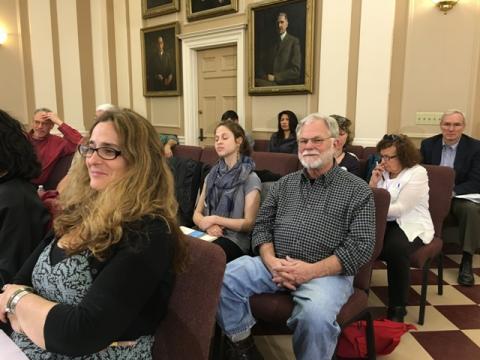Somerville’s Inclusionary Zoning Law Leads Nation

On Monday, May 9, 2016, the Somerville Board of Aldermen unanimously approved a proposal submitted by the member-led Affordable Housing Organizing Committee of the Somerville Community Corporation to implement stronger inclusionary zoning requirements. The vote followed a year-long campaign by AHOC to increase the inclusionary zoning rate, which will require a larger percentage of the housing units in new developments to be affordable.
The policy is considered a critical tool for creating affordable housing in areas undergoing rapid development. The Board of Alderman is to be lauded for enacting what national affordable housing advocates say is one of the most progressive ordinances nationally. It:
- Increases the inclusionary zoning rate to 20% citywide for all developments of 18 or more units. Developments of 8-17 units will be required to make 17.5% of the units affordable, and developments of 6-7 units will have the option of building an affordable unit or making a cash payment to the Somerville affordable housing trust fund.
- Distributes the affordable units among households ranging from 50%-110% MFI for rental, and 80%-140% MFI for ownership.
- Bases the affordable rent on all costs associated with the unit, including utilities, parking, and other amenities.
Why is this so great for Somerville?
Inclusionary zoning helps people like Martine Dreux, who left her longtime Somerville home when the cousin with whom she had lived was priced out of the city. Martine works as a health aide in Arlington, Mass., and does not have a car. So Somerville is ideal community for her.
After her move, Martine attended a series of workshops on affordable housing, and got involved with AHOC, which has been organizing to increase affordable housing opportunities in Somerville for over 10 years. The group was exploring ways to improve affordable housing options through a comprehensive zoning overhaul.
A Campaign Strategy
Faced with a wave of gentrification and displacement, AHOC members decided they couldn’t wait for the city or developers to take action.They wanted to address the fact that the median income for Somerville renter households is just $58,510 per year, and it would take an income of $95,360 to afford the $2,384 average monthly rent in the city.
In April 2015, AHOC members began to collect signatures in support of a “citizen petition” to amend the zoning code. They collected over 500 signatures from Somerville residents in support of increasing the inclusionary zoning requirement from 12.5% to 20%, among other changes. The proposal was submitted in October 2015, went before the Planning Board in February 2016, and was enacted by the Board of Aldermen in May 2016.
In the meantime, Martine couldn’t find an affordable place in Somerville, and she and her family moved to Watertown, but they weren’t happy there. Last year, when her lease was about to expire, she got a call from the property manager at Maxwell’s Green telling her she was eligible for an inclusionary 2-bedroom unit.
Now, thanks to AHOC’s persistence despite numerous obstacles, more people will have the same opportunity as Martine. AHOC members’ understand that inclusionary zoning is a critical tool for creating affordable housing for moderate and middle income families.
